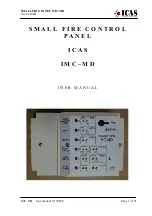
Xen IPK
Features and Specifications Manual
Features and Specifications Manual
Chapter 1 - 3
D
oc. N
o. 8201 -
Release
1.0
July 20
03
S
ECTION
9
B
ATTERY
D
ISPOSAL
The Xen IPK system includes the batteries listed below. When disposing of
these batteries, KSUs and/or ETUs, you must comply with applicable
Federal and State regulations regarding proper disposal procedures.
The Xen IPK CPUI( )-U( ) ETU provides memory backup for approximately
21 days. The Ni-Cd battery should be replaced about every two years.
IMPORTANT SAFEGUARDS FOR BATTERY DISPOSAL
DO NOT PLACE USED BATTERIES IN YOUR REGULAR TRASH! THE
PRODUCT YOU PURCHASED CONTAINS A NICKEL-CADMIUM OR
SEALED LEAD BATTERY. NICKEL-CADMIUM OR SEALED LEAD
BATTERIES MUST BE COLLECTED, RECYCLED OR DISPOSED OF IN
AN ENVIRONMENTALLY SOUND MANNER.
The incineration. landfilling or mixing of nickel-cadmium or sealed lead
batteries with the municipal solid waste stream is PROHIBITED BY LAW in
most areas. Contact your local solid waste management officials for other
information regarding the environmentally sound collection, recycling and
disposal of the battery.
Nickel-Cadmium (or sealed lead) batteries must be returned to a Federal or
State approved nickel-cadmium (or sealed lead) battery recycler. This may
be where the batteries were originally sold or a local seller of automotive
batteries. Contact your local waste management officials for other
information regarding the environmentally sound collection, recycling and
disposal of the battery contained in this product.
Table 1-1:
Battery Types and Quantities for KSUs and ETUs
Unit Name
Type of Battery
Quantity
B64-U( ) KSU
Lead Acid
2
CPUI( )-U( ) ETU
Nickel-Cadmium
1
DTR-1HM-1A TEL
Lithium
1
MIFA-U( ) ETU
Nickel-Cadmium
1
MIFM-U( ) ETU
Nickel-Cadmium
1
VMS(2)/(4)/(8)-U33 ETU
Lithium
1
FMS(2)/(4)-U33 ETU
Lithium
1














































